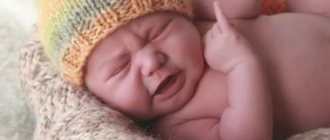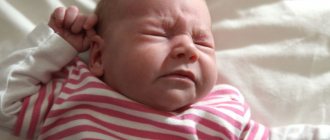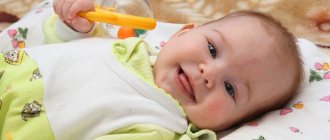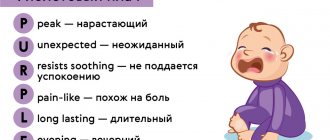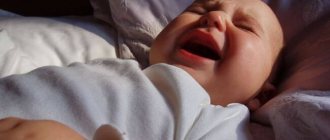Parents often notice with alarm that their baby’s nose is stuffy. This choking, as well as wheezing, whistling and other similar sounds in the nose, are common during and after feeding, as well as after sleep. In this case, the child may experience symptoms of a runny nose, but not always - sometimes the baby purrs.
Wheezing occurs when air, passing through the nasal stream, hits an obstacle - mucus, crusts, third almond, foreign body, etc. The nose of children in the first year of life is very narrow, and the slightest accumulation of mucus (which must be in the nose to disinfect and humidify the air) disrupts the free flow of air, resulting in all sorts of extraneous sounds.
In addition, the baby does not know how to blow his nose like an adult, and mucus in the nose can remain for a long time. At the same time, it thickens and dries out, making breathing difficult. If mucus has formed in the anterior parts of the nose, it can be easily removed using an aspirator or a small bulb. If the mucus is too deep, you should not try to pull it out - you can damage the baby’s mucous membrane, cause bleeding, and introduce bacteria into the nasopharyngeal cavity. It is the accumulation of mucus in the back of the nose that most often causes chirping sounds.
Causes
Increased formation of mucus, and as a result - grunting in the nose, perhaps for several reasons:
- runny nose, salt babies;
- cold runny nose;
- dry air;
- allergic reaction to dust, pet hair, pollen, household chemicals;
- cutting teeth.
Some of the mucus evaporates, and some flows into the throat and is swallowed. But if the air in the room is dry, the mucus fluid evaporates too quickly, and the mucus in the nose thickens. Thick sticky mucus prevents the nose from self-cleaning, accumulates and “jumps out” of the nose. A number of factors contribute to the accumulation of mucus, including the child’s insufficient mobility and constant horizontal position.
Runny nose
The first thought parents have if their child quacks his nose is a runny nose. It is rarely taken into account that a runny nose is a symptom, not a disease, and manifests itself in the following conditions:
- The infection is viral, less often bacterial. A runny nose caused by a respiratory tract infection is accompanied by intense mucus production, which is why the child cannot breathe freely through the nose and suffocates. The patient also experiences other symptoms of a cold - sneezing, coughing, redness of the throat, increased body temperature.
- Psychological runny nose. It happens that a baby at 2 months growls through his nose, but there are no other symptoms of the disease - he is cheerful and active, the temperature is normal. Then there is nothing to worry about - you are probably dealing with a salty runny nose. In newborns, as well as in children under 3 months, the mucous membranes are more moist than in adults. There may be so much mucus that it looks like a runny nose. However, this phenomenon has nothing to do with the disease, and treatment is not required.
- Allergic rhinitis. What can cause an allergy? In fact, a children's room is full of potential allergens - this includes animal hair, dust (or rather, the ubiquitous mites), household chemicals that mom used to wash the floors or wash the bed linen. With allergic rhinitis, a large amount of fluid and clear mucus are released from the nose, the child often sneezes, his eyes are red, and watery eyes occur.
Norm or pathology
A child spits up at 6 months - reasons, recommendations for mothers
If parents do not know whether to seek help from a doctor, it is necessary to observe the child and his behavior a little. Perhaps there really is no reason to worry. During observation, you should pay attention to such important indicators as:
- baby's body temperature;
- rate of weight gain;
- sleep at night and appetite during feeding (weak children usually eat poorly);
- the child’s appearance (for example, excessive pallor may indicate illness).
Keep in mind! Almost all newborn babies twitch their arms in their sleep; this is normal. To eliminate the problem, it is enough to swaddle the baby at night.
Mucus stagnation
If the child grunts, but almost no snot flows, it is likely that it accumulates in the deep parts of the nasal cavity. The baby cannot blow his nose, and even the mother cannot remove the mucus using an aspirator. A small child is in a horizontal (lying) position almost all the time. This is the first factor that causes mucus to flow out of the nose. Turn the baby on his stomach, on his side, while he is still unable to do this on his own. During feeding, keep your head elevated - this will not only make breathing easier, but will also prevent milk from entering the nasopharynx (which is often the cause of choking after feeding). The second reason is dry air. Remember that 50-70% humidity (at an air temperature of 18-22 ° C) is beneficial for the respiratory tract.
When to see a doctor
If the baby expresses refusal to eat , then this is already an unhealthy reaction. He may feel nauseous, have pain in his tummy, mouth, throat, etc...
Vomit. If you notice regurgitation in a large volume like a fountain, you should call a pediatrician. The cause of vomiting can be prolonged constipation, intoxication, or the entry of pathogenic microflora into the body.
Heartburn and regurgitation. If the baby often burps little by little, then this also indicates a violation of the digestive function. There are even rare cases of pathological obstruction of food. All this can only be diagnosed by a specialist. Children under one year of age should call a doctor at the slightest alarm.
Weight loss . A newborn baby cannot lose weight if he is healthy and receives proper nutrition in a timely manner. Therefore, if you notice weight loss, dry skin, or signs of dehydration, you should immediately consult a doctor.
The child may groan from discomfort caused by fever. Take your temperature. If the rise is insignificant, undress him, leaving only 1 layer of thin clothing. After half an hour, measure again. If the temperature persists, it means that the baby is not overheated, but sick.
Runny nose . If there is difficulty breathing, the child strains and groans, trying to cope with the discomfort. It is the elimination of nasal congestion that can help the baby. Only a doctor will determine the degree of complications from an incipient runny nose, measures to combat it and ways to eliminate congestion.
Dry crusts in the nose
If a small child squeaks through his nose or if you hear a whistling sound coming from his nose, dry crusts have most likely accumulated. The reasons for this are the same - dry air, lack of ventilation, dust in the room, excessive use of heating, infrequent walks with the baby.
To make it easier for the child to breathe, you need to drip the nose with saline drops, for example, Aqua Maris, Saline, etc. And then remove the crusts. You can remove it from the anterior sections of the nose with a damp swab (use a stick with a stopper for this), cotton wool or gauze. It is impossible to penetrate into the posterior sections of the nose. Apply moisturizing drops several times a day, and dry crusts in the nose will disappear on their own.
What to do if a newborn baby groans and sniffles?
- Simultaneously with groaning, a newborn baby may also make sniffles. Most often this means that for some reason it is difficult for him to breathe. The most common reason for this is the nasal passage not being cleared in time . If you do not do this regularly, a lump of mucus may accumulate and dry out in it, which will prevent the child from breathing freely.
- To help your baby, you need to clean his nose. It will also not hurt to moisturize the nasal passage with an age-appropriate preparation that contains sea salt. In addition, be sure to carry out daily wet cleaning in the room where the baby sleeps, and do not forget about the need for walks outside.
Clean your baby's nose
- The causes of sniffling or “grunting,” which, fortunately, are much less common, are congenital anomalies, possible curvature of the nasal septum, and the initial stages of rhinitis. In such cases, constant supervision by a pediatrician is necessary.
Postnasal drip command
Often mothers complain that nasal wheezing worsens in the morning and is also accompanied by a cough. At the same time, it is impossible to remove aspiration mucus, as if it is sitting very deep. In this case, postnasal drip syndrome may be suspected.
Postnasal gland syndrome is a pathological phenomenon in which mucus formed in the nasopharynx drains and accumulates on the back wall of the pharynx, causing inflammation.
Its symptoms:
- grunting in the nose at night and in the morning;
- cough after waking up;
- redness of the throat;
- restless sleep;
- feeling of a lump in the throat, sore throat (unfortunately, only older children can talk about this).
The cause of posterior gland disease syndrome is a runny nose, and all kinds (allergic, infectious - it doesn’t matter). Normally, mucus from the nose flows both out and into the pharynx, but should not accumulate on the walls of the pharynx. And here again we should mention the dryness of the air - it is this factor that causes the mucus to thicken, so it hangs on the back wall of the throat, causing a sore throat, coughing and grunting in the nose.
Teething
Sometimes you hear parents complain that their baby is growling through his nose for 2 months, as his first teeth have begun to emerge. Indeed, increased formation of mucus in the nose and, as a result, grunting, is often accompanied by teething. The fact is that teething is accompanied by local gingivitis. This results in increased blood flow to the mouth and increased saliva production. The secretion of mucus from the nose is largely related to saliva - both saliva and snot contain large amounts of substances such as lysozyme, interferons, and they are secreted in large quantities in response to inflammation.
Prevention and treatment
To help your child breathe easier, and also reduce the risk of upper respiratory problems in the future, you should follow the recommendations:
- regularly clean the anterior sections of the nose with damp cotton swabs or turundas;
- if a large amount of mucus accumulates in the nose, clean it with a special aspirator (after use, rinse with warm soapy water);
- play with the baby, turn him over on his stomach, massage him - this stimulates active breathing and prevents the accumulation of mucus in the nasopharynx;
- maintain optimal temperature and humidity in the house;
- during the season, moisten the child’s nasopharynx several times a day with nasal drops or maintain proper air humidity using a special device - an air humidifier;
- ventilate the children's room every day, preferably before bedtime;
- You should regularly wet the children's room, and also get rid of unnecessary carpets and soft toys;
- If symptoms of a runny nose appear, the child’s treatment should be discussed with the pediatrician.
Thus, a runny nose can be a physiological phenomenon, as well as a signal that the baby is having difficulty breathing due to illness. In any case, it should attract the attention of parents, become an incentive to improve conditions in the house and properly care for the baby’s nose.
Why does a newborn groan in his sleep?
What causes a newborn to groan?
In a dream, the baby may make strange sounds: grunting, grunting, sniffling. Sometimes they turn into crying. This means that the baby’s discomfort has intensified. If you observe this behavior in your child, there is no need to worry. Usually babies grunt in their sleep for the most harmless reasons:
- Because of colic
- Zaporov
- Runny nose
- Overheating or hypothermia
- Wet diapers
- Uncomfortable position while sleeping
What can you do to stop your newborn from groaning in his sleep?
First you need to find out what exactly is bothering your child.
If the problem is colic, the baby begins to scream shrilly in the evenings at about the same time. At the same time, he strains, often farts, presses his legs to his stomach, and clenches his fists.
If the problem is constipation, the baby cannot poop for two days, during bowel movements he strains and is capricious, and his feces become hard.
If the baby is overheated, he begins to sweat, his skin becomes hot, and his body temperature rises. If a baby is cold, he begins to tremble, his skin turns pale and becomes covered with pimples.
If your baby doesn't have any of these symptoms, he may be groaning due to wet diapers, dried crusts in the nose, or an awkward sleeping position.
As soon as you find the cause of your baby’s anxiety, take action:
For colic Before each feeding, place the baby on his tummy or give him a massage. During feeding, make sure that the baby does not swallow excess air, wraps his lips around the entire nipple and areola, and sucks your breast evenly. The bottle should be held at an angle of 45 °C and not shaken. After feeding, the baby should be held in a “column” so that he can burp. Colic will leave your baby alone if you give him natural Koli Krokodil drops. They relieve spasms, improve digestion and calm the baby. If your baby is constipated, you need to give him some water, put him to the breast more often, or give him formula, but in small portions. A nursing mother needs to include kefir, prunes, beets and pumpkin in her diet. Constipation can be a symptom of various diseases, so it is recommended to show your baby to a doctor. When your baby has a runny nose, you need to clean your baby’s nose using a vacuum aspirator and saline solution, which you can buy at any pharmacy or make yourself. If your baby does not have a runny nose, but you see dried crusts on his nose, they need to be removed. To do this, roll two cotton pads into flagella, soak them in warm water and gently wipe your baby’s nose. If the crusts are too dry, try Vaseline oil instead of water.
In case of overheating/hypothermia If the baby is too hot, he needs to be undressed, covered with a light diaper and given some water. After 30 minutes, put a thermometer on your child; if his temperature rises, call a doctor. If the baby is cold, you need to cover him with a blanket or cuddle him, and then give him breastfeeding or warm formula. To make the baby comfortable, the temperature in the room should be 19-22 ° C, and the air humidity should be around 70%.
Other reasons Check the baby's diaper, smooth the sheets under the baby, and put him in the crib more comfortably. If the baby is comfortable, he will stop groaning at night.
